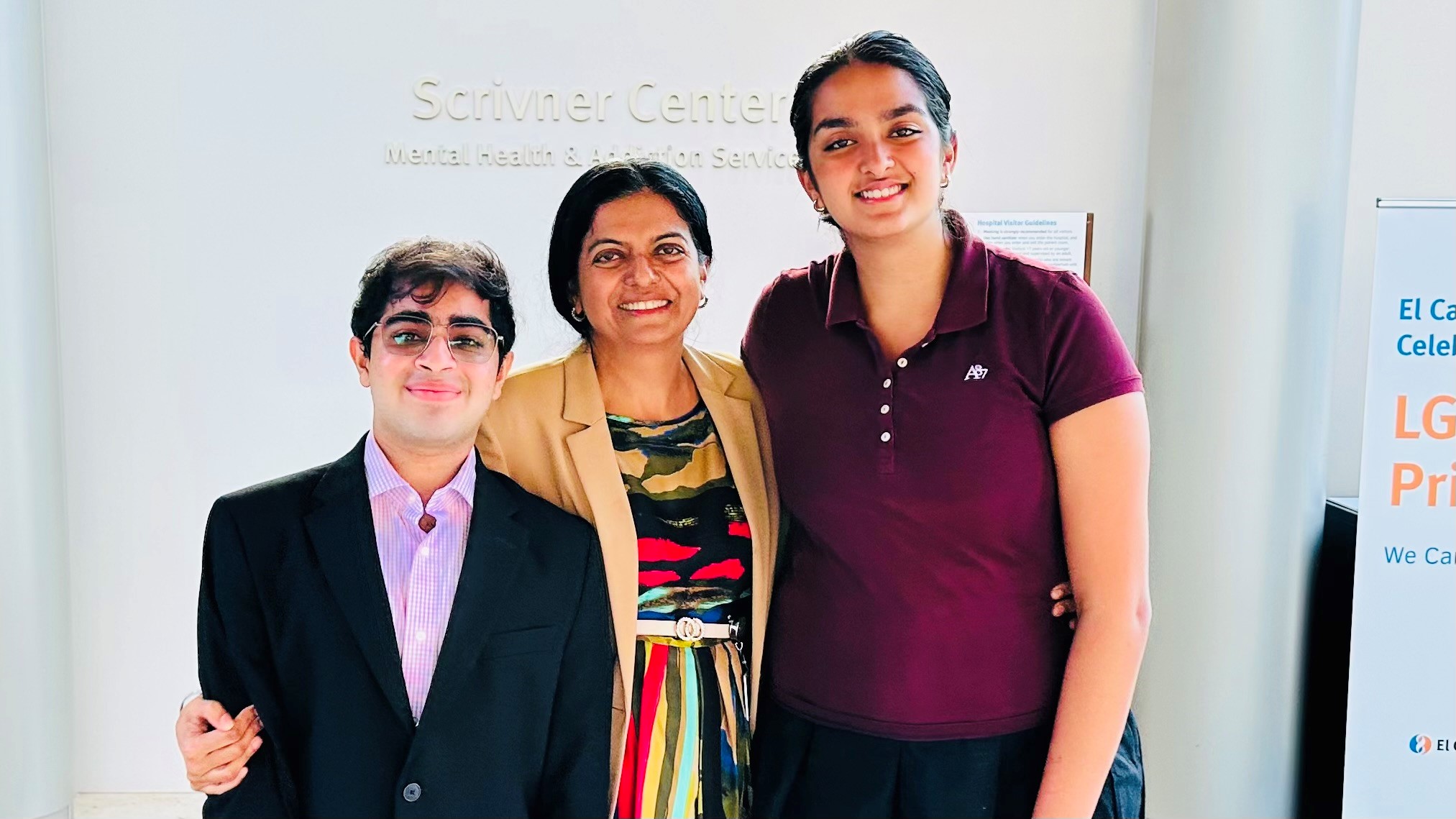Psychiatrist Helps Students Create Film on Postpartum Psychosis
Abstract
Hoping to educate and spur advocacy, two high school students worked with an expert in perinatal psychiatry to make a film on postpartum psychosis and how the American justice system responds to it.
Many Americans do not know that women can develop postpartum psychosis, and those who do are often misinformed by inaccurate media portrayals. This past summer, two high school students in California embarked on a project to educate the public and begin sparking change.

Nirmaljit Dhami, M.D. (center), worked with high school students Amar Sandhu (left) and Mehr Dhami (right) as they developed a film on postpartum psychosis, which will be presented at El Camino Health’s symposium on mental health later this month.
“It was shocking to me when I first read about it,” Amar Sandhu said of learning about postpartum psychosis. A senior at Menlo-Atherton High School in Atherton, Calif., he and Mehr Dhami, a senior at St. Francis High School in Mountain View, Calif., created a film about the illness. The film explores postpartum psychosis, the challenges faced by women with the illness who are in the criminal justice system, and what could be changed to better support these women.
Mehr Dhami’s mother, Nirmaljit Dhami, M.D., suggested that the students make the film. Nirmaljit Dhami is the medical director of inpatient perinatal psychiatry at El Camino Health in Silicon Valley. El Camino’s perinatal psychiatric unit is one of less than a handful of such units in the country, Nirmaljit Dhami said, and she said the film will be featured at El Camino’s Sixth Annual Maternal Mental Health Symposium on September 29.
Each year, high school students reach out to Nirmaljit Dhami at El Camino seeking internships, but few opportunities are available to them. She thought creating the film would be a way to involve local high schoolers while meeting another urgent need: education about postpartum psychosis and the need for greater specialty care for these patients. Often, the public hears only about women with postpartum psychosis after an incident of infanticide, which is rare but often highly publicized.
“We offer high-level services for a lot of moms, but many patients don’t get any care at all, often simply because of lack of information,” she said.
Education about postpartum psychosis is vital, she said, not only to educate women and their families about the illness, but also to support women who find themselves entangled in the criminal justice system. “The media focuses on the incidents of suicide or filicide, but they forget about the women who had a treatable illness and may now be stuck in the legal system, perhaps for the rest of their lives, because they couldn’t get help,” she said.
While making the film together, Sandhu and Mehr Dhami spent countless hours doing research for the film. They read papers not just about the diagnosis of postpartum psychosis, but also about the criminal justice system. They interviewed forensic experts, psychologists, psychiatrists, public defenders, authors, and experts on reproductive mental health, as well as numerous other experts on this topic.
The film explains how women with postpartum psychosis may not always be able to rely on the insanity defense. “If jury members have never been educated about mental illness, it’s incredibly difficult for them to empathize or understand a person who pleads not guilty by reason of insanity,” Mehr Dhami said.
The film is meant to be a piece of advocacy for the women who find themselves in the grips of postpartum psychosis and the justice system, raising awareness about the issue and encouraging compassion. “We’re hoping that the film can have an impact on changing the law and prompting a reconsideration of how we address individuals dealing with postpartum psychosis,” Sandhu said.
Mehr Dhami said she hopes the audience walks away from the film with newfound empathy for women who experience this disease. “It’s hard to empathize with the women we hear about in the news because we don’t understand the severity of the disease,” she said. “I hope people will try to understand and get them help, rather than viewing them immediately as murderers.”
Now, Nirmaljit Dhami said she has a pool of high school students interested in working on another film, which she intends to help them make for next year’s symposium. She said she hopes to continue doing this work, as it is not only a great way to advocate for patients, but it also includes the community in advocacy and education.
Already, Nirmaljit Dhami said that she and the students have spoken with California lawmakers about potentially introducing legislation to better protect women who experience postpartum psychosis.
“We definitely want to create change with the film, and we often think about change on a big scale, but I think change also can start small,” Mehr Dhami said. “The more people who see the reality of these cases and the way the justice system has treated some of these women, the bigger impact we will have over time.” ■
Resource
To view the documentary for free, sign up for El Camino’s symposium here. The symposium will be held September 29, but registrants will be able to watch the recorded film after that date.



